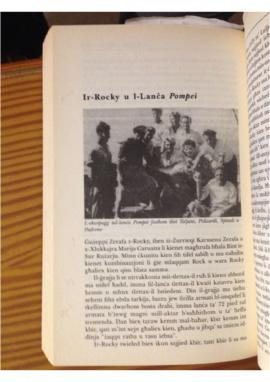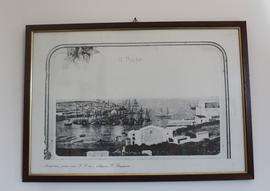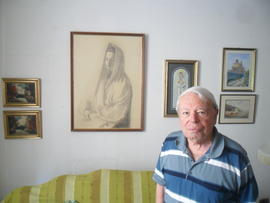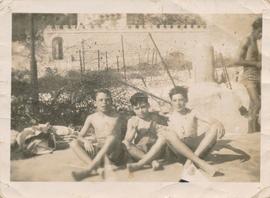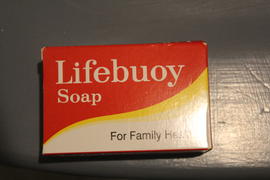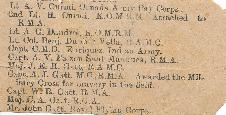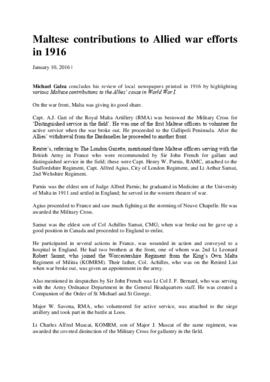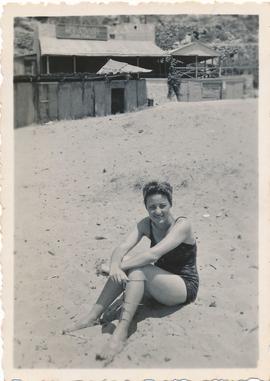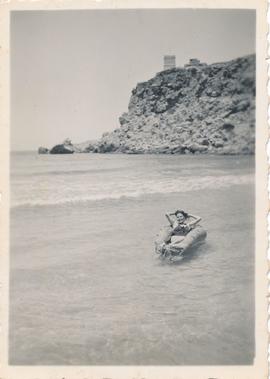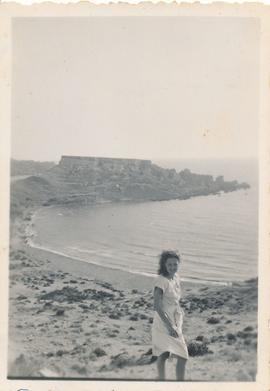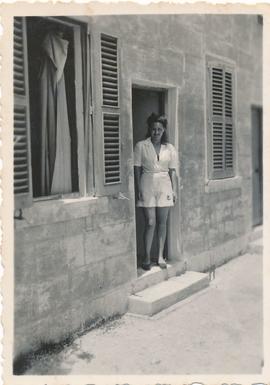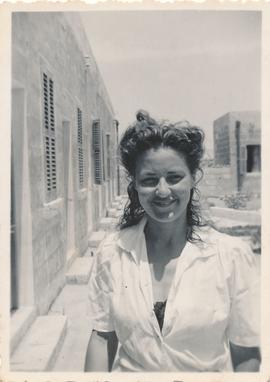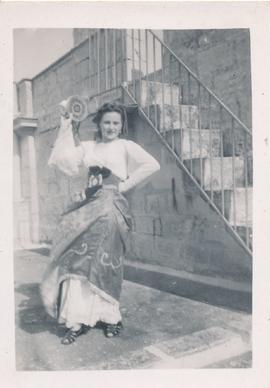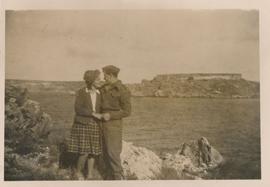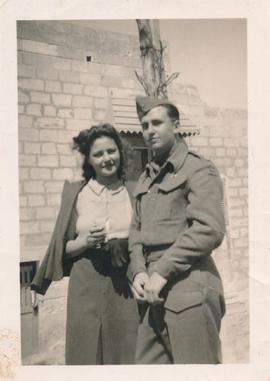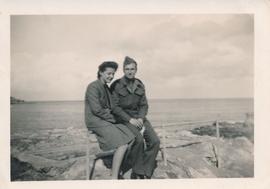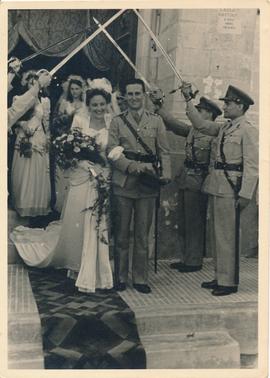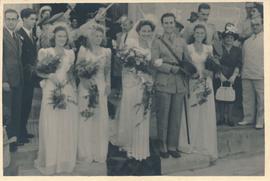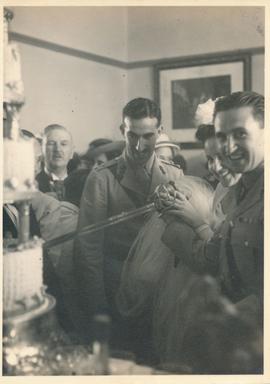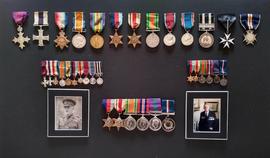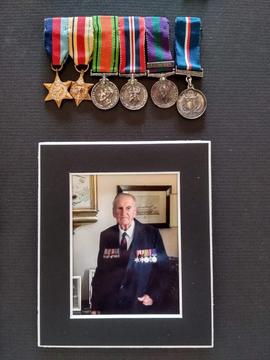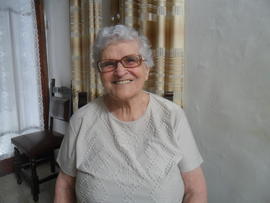Showing 593 results
Archival description381 results with digital objects Show results with digital objects
- MT NAM MEM-0049GM-03-02
- Item
- n/a
Part of Memorja
This short story is about an ordeal which the crew of the trawler Pompei experienced during a storm. The trawler together with a crew of thirteen men were on its way to the port of Lampedusa. The lighthouse of the port of Lampedusa was in sight, when a storm brew-up from the north west. The storm was so strong that the large trawler was almost going to capsize. The trawler’s captain Girlando Policardi who was an experienced sea captain from Lampedusa, was terrified and handed the helm to the trawler’s owner Giuseppi Zerafa, known as Ir-Rocky. The youngest member of the crew Giuseppe Mattina, who was 13 years old, was very seasick. After a twenty-four-hour ordeal they managed to arrive safely at the port of Lampedusa.
Part of Memorja
Part of Memorja
Part of Memorja
Part of Memorja
Part of Memorja
Part of Memorja
Part of Memorja
Part of Memorja
Part of Memorja
Part of Memorja
Part of Memorja
Part of Memorja
Part of Memorja
Part of Memorja
Part of Memorja
Part of Memorja
Part of Memorja
Part of Memorja
Joey (SuS) and Censu and Rocky
- MT NAM MEM-0049GM-02-12
- Item
- 1960s
Part of Memorja
- MT NAM MEM-0002GF-02-01
- Item
- 1900
Part of Memorja
- MT NAM MEM-0008LM
- Subfonds
- 1931-2017
Part of Memorja
Theme: Experiencing war - survival, shelter and food. Laurence Mizzi was born on the 28th of November 1931 in Vittoriosa (Birgu). He had 7 siblings: 1 sister and 6 brothers. His mother was a housewife and his father had worked at H.M. Dockyard. Laurence lived in Vittoriosa, Gudja and Paola and had a boy and a girl. He had worked as a teacher, a scriptwriter, a school broadcasting organiser and lastly as a member and Chairman of the Broadcasting Authority. He was also a publishing author with his focus being the Second World War. Three well-known works of his are 'Wartime Diary of a Maltese Boy,' 'The People's War, Malta: 1940-1943,' and 'When War Broke Out.'
- MT NAM MEM-0008LM-02-01
- Item
- 10/10/2017
Part of Memorja
Laurence Mizzi with two of his brothers at St. Paul's Bay
- MT NAM MEM-0008LM-02-02
- Item
- 1944
Part of Memorja
- MT NAM MEM-0008LM-01-01
- File
- 16/10/2017
Part of Memorja
Dates covered: 1931-1945. Laurence Mizzi spoke about the Italian declaration of war and the subsequent bombardments which had forced his family's relocation to Gudja as refugees. Laurence remembered the way of life in the rural areas, the disparity between the city dwellers and the villagers, the new living conditions which the former had to get accustomed to, the air raids, the black market, Victory Kitchen songs, the convoys and his take on the Maltese-born Italy-serving spy Carmelo Borg Pisani.
Laurence Mizzi_part01_16.07.2017
- MT NAM MEM-0008LM-01-01-01
- Item
- 16/10/2017
Part of Memorja
In the first part of the interview, Laurence had spoken about the Italian declaration of war and his family's immediate relocation to Gudja. He remembered the refugees trickling out of the inner harbour area with the hope of being given shelter in the villages. He then spoke about how these refugees had to adapt to new living conditions in the rural areas and the cultural differences these people had experienced as opposed to city life.
Laurence Mizzi_part02_16.07.2017
- MT NAM MEM-0008LM-01-01-02
- Item
- 16/10/2017
Part of Memorja
In the second part of the interview, Laurence Mizzi further explained the living conditions in Gudja and the cultural gulf between the Cottonera residents and the rural dwellers. He went on to recount the arrival of the German Air Force, the H.M.S. Illustrious air raid, contact with British servicemen, the underground shelters and the Victory Kitchens.
Laurence Mizzi_part03_16.07.2017
- MT NAM MEM-0008LM-01-01-03
- Item
- 16/10/2017
Part of Memorja
In the third part of the interview, Laurence Mizzi had started by reciting some verses about the Victory Kitchens. He spoke about the Black Market and the effects this racketeering had on the Maltese population, the arrival of the convoys, his opinion on the Malta-born Italy-serving spy Carmelo Borg Pisani and he mentions a particular accident involving himself and one of his brothers during the war.
- MT NAM MEM-0001ER-02-06
- Item
- 25/09/2017
Part of Memorja
This brand of soap generated many memories for the fishermen and the women of Lampedusa. This used to be bought in Malta during their travels and taken back home to their families.
List of Maltese officers who served overseas during the First World War
- MT NAM MEM-0007HLG-03-23
- Item
- n/a
Part of Memorja
Major Henry Louis Gatt_1_08.02.2018
- MT NAM MEM-0007HLG-01-01
- File
- 08/02/2018
Part of Memorja
Dates covered: 1882-1979. Major Henry Gatt (retd.) talked about his wartime experiences: his family's relocation to Rabat from Valletta, the shelters, the arrival of Spitfire aircraft and his military service. The second part of the interview consisted of his post-War service, especially his posting in the final months of the British Mandate of Palestine. He remembered the King David Hotel bombing, the terrorist groups, the so-called 'Sergeants Affair' and he finished off by recalling the rundown and the final withdrawal of British forces from Malta.
Major Henry Louis Gatt_1_15.03.2018
- MT NAM MEM-0007HLG-01-03-01
- Item
- 15/03/2019
Part of Memorja
Major Henry Gatt's (retd.) father was the late Brigadier Alfred Joseph Gatt and during the interview Henry talked about his father's military service in Gallipoli during the First World War.
Major Henry Louis Gatt_2_15.03.2019
- MT NAM MEM-0007HLG-01-03
- File
- 15/03/2019
Part of Memorja
Dates covered: 1882-1950. Major Henry Gatt's (retd.) father was the late Brigadier Alfred Joseph Gatt and during the interview Henry talked about his father's military service in Gallipoli during the First World War.
Major Henry Louis Gatt_part01_08.02.2018
- MT NAM MEM-0007HLG-01-01-01
- Item
- 08/02/2018
Part of Memorja
In the first part of the interview, Henry Louis Gatt spoke about conscription into the Royal Malta Artillery (R.M.A.), his family's evacuation to Rabat, air raids, shelters and his father, Brigadier Alfred J. Gatt.
Major Henry Louis Gatt_part02_08.02.2018
- MT NAM MEM-0007HLG-01-01-02
- Item
- 08/02/2018
Part of Memorja
In the second part of the interview, Henry Louis Gatt continued to talk about conscription before mentioning a chemical warfare which he had to attend in Monte Cassino, Italy. He described the Victory Kitchens, the ever-decreasing rations of both food and munitions and the lack of sanitation.
Major Henry Louis Gatt_part03_08.02.2018
- MT NAM MEM-0007HLG-01-01-03
- Item
- 08/02/2018
Part of Memorja
In the third part of the interview, Henry Louis Gatt talked about his post-War military career. He had listed his overseas postings and explained in detail the operations he had to go on when he was stationed in Palestine. He mentioned the Jewish terrorist groups, the King David Hotel bombing, the rundown of the British services in Malta and the final British withdrawal in 1979.
Maltese Fishermen - Rocky's crew
- MT NAM MEM-0049GM-02-13
- Item
- 1960s
Part of Memorja
Maltese Fishermen - Rocky's crew
- MT NAM MEM-0049GM-02-14
- Item
- 1960s
Part of Memorja
Maltese Fishermen - Rocky's crew
- MT NAM MEM-0049GM-02-15
- Item
- 1960s
Part of Memorja
Maltese Fishermen - Rocky's crew
- MT NAM MEM-0049GM-02-16
- Item
- 1960s
Part of Memorja
Maltese contributions to Allied war efforts
- MT NAM MEM-0007HLG-03-25
- Item
- 10-01-2016
Part of Memorja
The Sunday Times of Malta.
Author: Michael Galea
https://timesofmalta.com/articles/view/Maltese-contributions-to-Allied-war-efforts-in-1916.598304
Maria Therese Gatt at Għajn Tuffieħa bay
- MT NAM MEM-0007HLG-02-16
- Item
- June 1947
Part of Memorja
Maria Therese Gatt née Frendo Randon at Ghajn Tuffieha bay during her honeymoon. The sign on the restaurant reads: 'FIRST AND LAST RESTAURANT. JOHN FENECH'
The proprietor could have been known by the nickname "Kukkuru."
Maria Therese Gatt at Għajn Tuffieħa bay
- MT NAM MEM-0007HLG-02-17
- Item
- June 1947
Part of Memorja
Maria Therese Gatt, née Frendo Randon at Ghajn Tuffieha bay during her honeymoon. Ghajn Tuffieha Tower and a Second World War-era beach post are visible at the edge of the cliff.
Maria Therese Gatt at Għajn Tuffieħa bay
- MT NAM MEM-0007HLG-02-13
- Item
- June 1947
Part of Memorja
Maria Therese Gatt née Frendo Randon at Ghajn Tuffieha bay during her honeymoon. The promontory in the background is 'Ras Il-Qarraba.'
Maria Therese Gatt at the living quarters at Għajn Tuffieħa camp
- MT NAM MEM-0007HLG-02-18
- Item
- June 1947
Part of Memorja
Maria Therese Gatt, née Frendo Randon standing in the doorway of a billet at Ghajn Tuffieha camp during her honeymoon.
Maria Therese Gatt at the living quarters at Għajn Tuffieħa camp
- MT NAM MEM-0007HLG-02-19
- Item
- June 1947
Part of Memorja
Maria Therese Gatt, née Frendo Randon standing by billets at Ghajn Tuffieha camp during her honeymoon.
Maria Therese Gatt in carnival costume
- MT NAM MEM-0007HLG-02-20
- Item
- 1947
Part of Memorja
Maria Therese Gatt, née Frendo Randon in carnival costume
Maria Therese and Henry Louis Gatt during their honeymoon
- MT NAM MEM-0007HLG-02-12
- Item
- June 1947
Part of Memorja
Maria Therese Gatt née Frendo Randon and Henry Louis Gatt while on their honeymoon. The promontory in the background is 'Ras Il-Qarraba.'
Maria Therese and Henry Louis Gatt during their honeymoon
- MT NAM MEM-0007HLG-02-10
- Item
- June 1947
Part of Memorja
Maria Therese Gatt née Frendo Randon and Henry Louis Gatt in front of the living quarters at Ghajn Tuffieha camp on their honeymoon.
Maria Therese and Henry Louis Gatt during their honeymoon
- MT NAM MEM-0007HLG-02-11
- Item
- June 1947
Part of Memorja
Maria Therese Gatt née Frendo Randon and Henry Louis Gatt on their honeymoon.
Maria Therese and Henry Louis Gatt wedding ceremony
- MT NAM MEM-0007HLG-02-05
- Item
- 26-06-1947
Part of Memorja
Maria Therese Gatt, née Frendo Randon and Henry Louis Gatt leaving church after their wedding ceremony. Major Maurice G. Agius (retd., first from right) was interviewed for the theme Experiencing War: Survival, shelter and food.
Maria Therese and Henry Louis Gatt wedding ceremony
- MT NAM MEM-0007HLG-02-06
- Item
- 26-06-1947
Part of Memorja
Maria Therese Gatt, née Frendo Randon (centre, front row) and Henry Louis Gatt (second from right, front row) leaving church after their wedding ceremony.
Maria Therese and Henry Louis Gatt wedding reception
- MT NAM MEM-0007HLG-02-07
- Item
- 26-06-1947
Part of Memorja
Brigadier Alfred Joseph Gatt (Henry's father, at back), Antoine Pace Bonello (the best man at Henry's wedding), Maria Therese Gatt, née Frendo Randon and Henry Louis Gatt at the wedding reception.
Medals awarded to Alfred Joseph Gatt and Henry Louis Gatt
- MT NAM MEM-0007HLG-03-11
- Item
- 1914-1992
Part of Memorja
Alfred Joseph Gatt's medals are in the top row and Henry Louis Gatt's medals are between the two photographs
Medals awarded to Henry Louis Gatt
- MT NAM MEM-0007HLG-03-12
- Item
- c. 1943-1992
Part of Memorja
- MT NAM MEM
- Fonds
- 1997 -
MEMORJA is the oral, sound and visual archive of the National Archives of Malta (NAM). Our mission is to record life stories from people and groups who are underrepresented in the historical record. The roots of the project lie in the National Memory Project (NMP), initiated in 2004, followed by collaboration with the Public Memory Archive (PMA) at the University of Malta. Established in 2017, MEMORJA has now developed as the principal depositor of our national and public memory.
MEMORJA employs advanced methods in oral history, ethnography and cutting-edge archival approaches to collect, record, preserve and make accessible individual and shared histories passed on orally, visually and through sound. We are interested in the diversity of individual memories, life histories, community experiences and traditions, indigenous knowledge and shared historical events of the Maltese people.
MEMORJA’s oral history-trained staff and volunteers carry out continuous ethnographic fieldwork in the community, enriching our archives with a panoply of memories and recollections, personal photographs, documents, ephemera, artifacts, audio and video recordings and film reels which are generously donated, preserved and made available to all. The ubiquitous presence of our fieldworkers carrying out research and oral history interviews in the community has made the NAM ever more visible. This has generated extensive friendships and a unique relationship of trust between the National Archives and the public.
The project covers different themes related to life in, and experiences of, Malta during the twentieth century. The first five themes within which the research began are: Experiencing War: Survival, Shelter and Food; Migration: the British in Malta; Public Administration; Lampedusa and Malta Connections, and Bell-Ringing. There are many records in different formats, including analogue and digital audio recordings; photographic material (both print and digital); digital video recordings; original and digitised ephemera (diaries, press cuttings, books etc.) and written accounts in electronic format.
National Archives of Malta, Central Archive
- MT NAM MEM-0012MV
- Subfonds
- 1927-2017
Part of Memorja
Theme: Experiencing war - survival, shelter and food. Mikelina Vella was born on the 5th of January 1927 in Mosta. Her parents had owned a drapery shop and she had eleven siblings. She had spent the 1950s and 1960s working as a cleaner for British service families in Sliema and Ta' Xbiex. She later worked as a batwoman for Royal Air Force (R.A.F.) airmen until 1974 and then worked as a cleaner at the Mtarfa Military Hospital between 1974 and 1979. Her last job was in the laundry section of St Vincent de Paul retirement home and she had retired in the early 1980s.
- MT NAM MEM-0012MV-02-01
- Item
- 27/06/2017
Part of Memorja
- MT NAM MEM-0012MV-01-01
- File
- 27/06/2017
Part of Memorja
Dates covered: 1927-2017. In her interview, Mikelina Vella described her wartime experiences in Mosta. She talked about the air raids, the Air Raid Precautions (A.R.P.), the scarcity of food, the black market and the Operation Pedestal convoy. She finished off by singing a wartime song from her childhood.
Mikelina Vella_part01_27.06.2017
- MT NAM MEM-0012MV-01-01-01
- Item
- 27/06/2017
Part of Memorja
In the first part of the interview, Mikelina Vella started by talking about her childhood. She recalled the declaration of war, life in the shelters, the air raids and the refugees which had sought shelter in Mosta.
Mikelina Vella_part02_27.06.2017
- MT NAM MEM-0012MV-01-01-02
- Item
- 27/06/2017
Part of Memorja
In the second part of the interview, Mikelina Vella explained the Victory Kitchens and the food (or lack thereof) that used to be available. She decried the lack of medical care - her family had not been visited by a doctor during the war - and the lack of sanitation. She recalled the (Air Raid Precautions) A.R.P., unexploded bombs and the bombs which had penetrated the Mosta Rotunda.
Mikelina Vella_part03_27.06.2017
- MT NAM MEM-0012MV-01-01-03
- Item
- 2017-06-27
Part of Memorja
In the third part of the interview, Mikelina Vella remembered the British servicemen that used to frequent Mosta from the nearby aerodrome at Ta' Qali and she later spoke about the award of the George Cross and its presentation to the people of Mosta. She then finished her interview with a wartime song.
Part of Memorja
Part of Memorja
Part of Memorja
Part of Memorja
Part of Memorja
Part of Memorja
Part of Memorja
Part of Memorja
Part of Memorja
Part of Memorja
Part of Memorja
Part of Memorja
Part of Memorja
Part of Memorja
Part of Memorja
